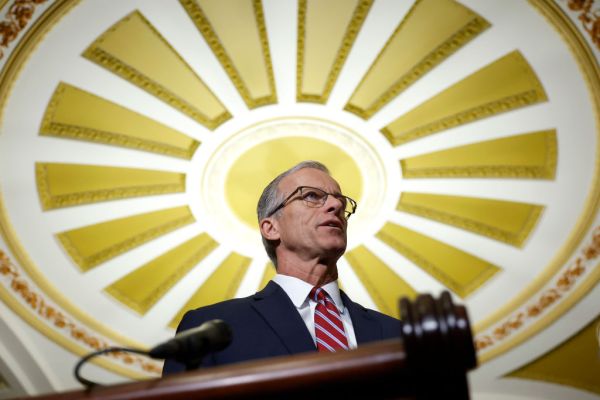
Gentle readers, I have not been keeping up with our correspondence during election season. I am sorry for you, but even sorrier for myself. Reading and responding to your notes is my favorite part of this newsletter. So this week, we’re leaning in on the Mailbag and starting with answers to your questions.
We’ve got it all: Trump transition, the limits of a mandate, the deficiencies of the Democratic campaign, media criticism, and even some arcane presidential history. Huzzah!
I hope you enjoy reading it half as much as I liked responding.
“Is [Donald Trump] playing 3D chess by nominating Matt Gaetz for attorney general? Gaetz’s chance of being confirmed by the Senate is zero. However, by nominating Gaetz, Trump can identify Republican senators to target in the 2026 midterms and 2028. Additionally, if Gaetz is denied, Trump could put maximum pressure on [Florida Gov. Ron DeSantis] to appoint Gaetz to the anticipated open Senate seat created by the confirmation of [Sen. Marco Rubio] as secretary of state. DeSantis would have to declare his loyalty to MAGA with an appointment or forever be branded a traitor to the cause and exiled alongside [former Secretary of State Mike Pompeo] and [former U.N. Ambassador Nikki Haley] to the hinterlands of the 2028 presidential race.”—Dan Burch, Turlock, California
Mr. Burch,
I’m very sure that if everything turned out that way, the president-elect’s supporters would say that it was the plan all along.
I, for one, don’t tend to put much stock in grand political designs. Predicting what the electorate and issue set will be in two years, let alone four, is a fool’s errand. We elect presidents based on the present and recent past, but they have to govern in the future. Will Trump be the goat or the GOAT in Republican politics halfway through or at the end of his term? He was political poison for two years after his first term and then won this year. Who knows?
Nor do I think Trump thinks that way. He is probably very sincere about following his “gut,” and the Gaetz decision, which took his own transition team by surprise and seems to have been cooked up on a short flight to Washington, falls very much into that category.
I very nearly agree with you about the chances that Gaetz will be confirmed. I’d put it above zero, but not by much. Might it come to pass that the Senate commits a historic act of self-abnegation and surrenders its enormous power of confirmation? Maybe. But I doubt there are 51 votes to recess so that Trump can plow his Cabinet into place without even so much as a confirmation hearing. Senators don’t like to be told to sit down and shut up.
But Gaetz’s nomination failing might not be so bad for Trump. It will certainly make whoever he appoints to that post next look more reasonable, and do the same for the rest of his nominees. If Gaetz is the sacrifice at the altar of the Senate, Republicans may feel better about letting some other wild ones pass.
I doubt that extends to Tulsi Gabbard. One of the last places you find functional bipartisanship in the Senate is around matters of national intelligence, and she’d be a bitter pill for them to swallow. Robert F. Kennedy Jr. is a little easier for Republicans, who just don’t spend that much time thinking about the Department of Health and Human Services. He can have his hearing, which will be wildly entertaining, and might even get him to 51 votes (or 50 votes and a J.D. Vance tiebreaker). Either way, the stakes are lower in the eyes of Republicans, many of whom disdain the agency anyway.
The person for whom a doomed Gaetz nomination works best for, though, is Gaetz. Aside from having an excuse to flee the House in advance of a damning ethics report, he might get a massive national platform for the kind of smack-talking sassafras that has been his well-cultivated brand in politics. His confirmation hearings would not be entertaining, but they would be piles and piles of red meat for both Gaetz and his Democratic adversaries on the Senate Judiciary Committee.
Would Trump then put “maximum pressure” on DeSantis to appoint Gaetz to the Senate vacancy? Maybe, but the timing may not work out. It takes longer for nominations to fail than it does for them to succeed, and Rubio will go through the Senate like a rocket. His credibility, born of that same bipartisan accord around national security, and his well-vetted life should mean that he will be among the very first to be confirmed, maybe even on Trump’s first day in office. DeSantis will want to have an appointee ready as soon as the seat opens, which would rule out Gaetz.
I expect DeSantis, who is term-limited and can’t run again in 2026, is preparing another presidential run for 2028. Whatever pressure Trump could apply on Gaetz’s behalf has to be balanced against the harm that would come from placing a person so broadly disliked by party leaders in his state and nationally in the Senate. More likely, I expect Gaetz to go on to be more of what he has been: a media personality with an intense following among dudes who really love sick burns. That could be very profitable, and set Gaetz up for subsequent runs for office from the presidency on down in the future.
Generally, I’d counsel you to wait and see how Trump, who will be almost 83 by the end of this term, does. How much he dominates the Republican Party will depend almost entirely on how successful his presidency is. The selection of Gaetz, even if it was just a bargaining ploy, a favor to a loyal friend, and a stunt—maybe especially if it was just a stunt—does not bode well for future success.
Many of Trump’s other picks, including Rubio, point in the direction of a steadier, more effective administration than his first one. But, as always, with Trump things tend to get very emotional and very messy.
Temperately,
c
“Writing anecdotally, I became incredibly turned off by the volume of Harris advertising. It seemed for every one Trump ad there were three sequenced Harris ads, two of which were about saving abortion. Do you think voters became frustrated by the constant advertising and literally turned on it? Could any negative reaction to the sheer volume have had an adverse impact on voting for Harris?”—Marty Tantum, Yardley, Pennsylvania
Mr. Tantum,
First, my condolences. Yardley is a lovely town, but sits on one of the major political fault lines in our nation. Bucks County went for Donald Trump by 788 votes this year after going for Joe Biden by 17,345 votes four years ago and for Hillary Clinton by 2,699 votes four years before that. Living in a swing county in a swing state does not make for pleasant football viewing.
Having no idea how you voted (or even if you did), it’s hard to draw any inferences about how this kind of saturation bombing advertising affects voters based on your experience. I could see how overwhelming numbers of ads might push a voter who was on the fence about voting for the other candidate into their arms. A Trump-skeptical voter might get so fed up with Harris ads, especially those that celebrated access to elective abortions, that it made them determined to vote for the other guy.
Overall, though, Harris’ campaign effectively blunted the national shift from blue to red, just not by enough. The national shift was nearly 7 points, but less than half that in the swing states like yours. That would suggest that the ad barrage helped more than hurt, but we will never know.
You can just be happy that you can watch the end of college football season without being inundated with campaign ads!
Fast-forwardingly,
c
“I love your stuff. But, when on the air, and in your columns, you need to work on breathlessly belting out headlines with lots of adverbs and adjectives, so we know you’re serious. What can I say? I love sarcasm. But, I appreciate that you don’t use it, or any other hyperbole. I really think that you’re like a throwback to those great newsmen I took for granted as a kid: Huntley and Brinkley and Cronkite. I am so tired of biased cheerleading masquerading as reporting. Thank you for not doing that. I hope it catches on.”—Eric Sharf, Portland, Oregon
Mr. Sharf,
I very much appreciate the sentiment, but I don’t think that I’m as serious as you hope I am. Certainly, I don’t want to be self-serious.
I’m with you when it comes to the straight news types. When you’re delivering what we in the business call “commodity news”—just the facts, ma’am, and all that—or sharing the results of a meaningful journalistic investigation, I’m all for keeping it dry and dispassionate.
But whether it’s in my writing at The Dispatch or on my Sunday show, a podcast, a panel at the American Enterprise Institute, or someplace else, I’m not usually reporting anything. I’m an analyst who is trying to provide context and help news consumers make some sense of what is happening and prepare for what may happen next.
I’m like the weather man, and any decent sense of humility demands that I don’t start thinking that I’m the lead story. Like a meteorologist during a hurricane or a blizzard, I have my little moments every couple of years, but the rest of the time, political analysis shouldn’t be the most important thing we do in news. America is blessed and cursed with having lots and lots of elections, but in the scant time in between, we should focus more on the reason we have politics—so people can resolve disputes and go on living their lives—and not the politics themselves.
Aside from that defense of being a bit flippant in my coverage, there’s also this: It is my nature. There are a lot of hard-boiled, disillusioned cynics in my business, or certainly a lot that aspire to be that way. But there are not enough skeptics. And that’s what I am by nature.
To do this work well, I think it is essential to wear politics like a loose garment. Keeping it light suits me and helps me to keep things in perspective.
Cheerfully,
c
“While we’d like to claim Grover Cleveland as our own despite his long history in the Empire State, we’d also like to reject Woodrow Wilson—a Virginian by birth—even though he was governor of New Jersey as a trade. Love the Dispatch columns and Ink Stained Wretches podcast. Thanks for all you do.”—Robert Geist, Dover, Delaware
Mr. Geist,
I gather from your hometown and your Jersey pride that you, like Cleveland, left your native state for a neighboring one. Cleveland, though, retired back to New Jersey after his second presidency. He chose Princeton even over his beloved Gray Gables on Cape Cod. I think New Jersey can and should take pride in its son Cleveland, the most underrated president of the 19th century.
As for Woodrow Wilson, I’m afraid you’re stuck with him, just as I have to bear my part of that burden. His family lived at my alma mater, Hampden-Sydney College in Virginia, where his father taught before the future president was born. The lore went that Wilson was conceived on campus, but while the dates don’t quite match up, we must accept our share of the blame.
Penitentially,
c
“Usually enjoy your analysis—find it educational usually, but your bucket of cold water in this case seems like a ‘yeah, but’ argument that will likely be seen by many as sour grapes. Clearly it wasn’t a landslide as the term was used in most of the 20th century, but it was a clear mandate and that is much more worth noting than dissecting the definition of a landslide. Hope, at sometime, you address the realignment question—not sure everyone agrees on that definition either—but that one is worth wading in the weeds.”—Tom Mason, Bakersfield, California
Mr. Mason,
Ehhhhhhh … I think people who are looking for grapes to be either sweet or sour in their political analysis have many, many other options. It’s grapes as far as the eye can see across most of the political media, so I mostly try to stay out of that vineyard. I want to flatter your intellects, not your feelings.
As for what constitutes a landslide, we can certainly leave out the presidents prior to the 12th Amendment in 1804 and probably even those prior to 1832, by which time all the states (except for South Carolina) had moved to having voters choose electors. You also have to base your assessment on percentages of the Electoral College since the number of electors has grown over time. You’d also like to see a big popular vote majority. It’s inherently subjective after that.
Bill Clinton won more than two-thirds of the electoral votes in both of his runs. Landslide? Sure. Barack Obama missed that threshold in 2008, but won places where Democrats don’t usually win (Indiana and North Carolina) and had long coattails, bringing eight new Democratic senators and 21 House members along with him. If Democrats wanted to call that a landslide, I would raise an eyebrow, but just probably not argue too much. But I would have pointed out that wasn’t the big time, like Franklin Roosevelt’s first two wins, both of Ronald Reagan’s victories, Richard Nixon’s reelection, or Lyndon Johnson in 1964, all of which nabbed more than 90 percent of the Electoral College and had double-digit popular vote victories.
Trump is an easier call since he ended up with less than 60 percent of the electoral votes available and something like a 2-point popular vote advantage and if it’s an outright majority at all, it will be a very narrow one. While he brought (probably) four new Republican senators along with him, the House looks like Republicans will end up not gaining any seats and potentially even having a small net loss. Trump did win in one state where Republicans usually don’t—Nevada—but Joe Biden won two places normally not hospitable to Democrats—Arizona and Georgia—and 2020 sure wasn’t a landslide either.
The only real value in ranking presidential victories is connected to your other point: the question of a mandate.
The question of mandates is closely connected to the message voters were sending, and scale of victory is one way we evaluate that. Then there are different kinds of mandates.
Reagan’s 1984 win was both a landslide and a mandate, while his 1980 victory was a landslide but more appropriately understood as a rejection of the party in power than wholesale acceptance of the Gipper’s platform. Even so, Reagan had campaigned on his core issues: tax cuts and a defense buildup, and stayed the course—even after a stinging rebuke from voters in the 1982 midterms—and won a referendum election carrying 49 states two years later.
Clinton’s landslide win in 1992 was an even less authoritative mandate than Reagan’s in 1980. Clinton famously ran on economic issues that year but once in office undertook many measures that offended voters: universal health insurance, gays in the military, gun control, etc. Democrats got kicked in the shorts in 1994, Clinton adjusted and moved to the middle. He won a landslide and a mandate in 1996 for a kind of squishy centrism: balanced budgets, tough on crime, etc.
The problem for Republicans who now need to believe that Trump’s decisive victory was a landslide is that they are looking for a bigger mandate than they have. Trump very clearly campaigned on immigration restrictions, tariffs, tax cuts, and anti-wokeism. He has an obvious mandate for action on those fronts, certainly to roll things back to where they were in his presidency. But how much more than that? Hard to believe it was to make the Justice Department his fiefdom, wreck shop in intelligence agencies, or do whatever the heck Robert F. Kennedy Jr. wants to do at the Department of Health and Human Services.
Politics, like much of life, centers on the issue of self-awareness.
A president can push his mandate as Reagan did in 1980 and pull it off by succeeding or, as Clinton did, reversing course and getting back in line with what voters wanted in the first place. But a president who exceeds his mandate and can’t deliver the goods is worse than a lame duck; he’s a pariah.
Biden cost the Democrats this year because he and other Democrats weren’t humble in their interpretations of the results in 2020 and 2022. If Trump and Republicans make the same mistake, they will suffer the same fate, particularly if chaos reigns.
Without sourness,
c
Holy croakano! We welcome your feedback, so please email us with your tips, corrections, reactions, amplifications, etc. at STIREWALTISMS@THEDISPATCH.COM. If you’d like to be considered for publication, please include your real name and hometown. If you don’t want your comments to be made public, please specify.
TIME OUT: HOOVES UP
New York Times: “The animal that arrived at Hannah Huckabay’s barn this past summer had been advertised as a mule, but it didn’t look like any mule she’d ever seen. She had bought it cheaply online from a livestock auction with thoughts of reselling it or putting it up for adoption, as she does with many last-chance equines at her stables in Aurora, Colo. … It had a broom-bristle mane and a wedge-shaped head, an equine silhouette more often found in a cave painting than on a ranch. ‘Is he a Przewalski’s?’ … It couldn’t be, could it? The Przewalski’s is so rare that the horse, native to Mongolia, was once extinct in the wild. … These precious few horses don’t typically knock around auctions in the western United States. … It all started in February, when Ms. Huckabay paid $1,375 for the animal she saw advertised online. … Ms. Huckabay’s daughters named him Shrek, and he was as wild as all get out.”
PRESIDENTIAL UNDERVOTE COSTS GOP KEY SENATE SEATS
Politico: “Even as President-elect Donald Trump swept every swing state, four of those battlegrounds are sending Democrats to the Senate. That’s the highest number of Senate-presidential ticket splits in 12 years, and a warning sign for Republicans as they try to protect and grow their ranks in 2026. … They flipped a true swing state in Pennsylvania but suffered losses in Michigan, Wisconsin, Nevada and Arizona. That means they’ll fall well short of the 57 seats they might have had, thanks to undervoting, smaller Trump coattails and well-funded and disciplined Democratic opponents. … Tens of thousands of Trump supporters across key states appeared to skip the Senate ballot. It’s normal for Senate races to see fewer votes cast than at the presidential level, but Trump-won counties had larger gaps than counties won by Harris, suggesting it was Trump voters in Republican areas in particular who left the Senate contests blank.”
Recount in Pennsylvania as Bob Casey has yet to concede: NBC News: “Secretary of the Commonwealth Al Schmidt announced Wednesday that the unofficial results showing a narrow race have led to a recount. Schmidt noted in his announcement that counties must begin the recount no later than Nov. 20 and that they must complete the process by noon Nov. 26. The results will not be published until Nov. 27. Just over 29,000 votes, or 0.4% of the total votes cast, separate the two candidates, with [Dave McCormick] narrowly leading. Any margin under 0.5 percentage points triggers a recount in Pennsylvania. … Casey has not conceded the race. … The current vote count shows a sizable drop-off between Trump and McCormick, with Trump winning more than 100,000 more votes than McCormick. Casey is lagging behind Vice President Kamala Harris by around 40,000 votes.”
Sherrod Brown leaves door open for 2026 rerun: Washington Examiner: “Outgoing Sen. Sherrod Brown‘s (D-OH) political career may not be over despite losing his reelection bid last week to represent Ohio in the Senate to Republican Sen.-elect Bernie Moreno. … ‘I’m not ruling anything out,’ Brown said. Brown lost to Moreno in last week’s Senate election, 50.2%-46.4%. … He suggested that President-elect Donald Trump and Republicans were successful in last week’s elections because Democrats failed to focus on middle-class workers, saying he has ‘seen that support erode’ in recent years. … Gov. Mike DeWine (R-OH) has yet to announce who he will appoint to Vance’s seat, which will be vacant in January. Reports suggest the Ohio governor is considering Republican state Sen. Matt Dolan, Ohio Secretary of State Frank LaRose, and former Ohio Republican Party Chairwoman Jane Timken.”
This year, don’t blame the polls: Cook Political Report: “If you were surprised by the outcome of this election, it’s not because the polls led you astray (well, except for that late Des Moines Register poll…). As we wrote the week before the election, even as the race was exceedingly close, it was likely that the Electoral College outcome wouldn’t be all that close, given that the last two elections saw the battleground states all vote the same way. That’s exactly what happened this time around. … While Sun Belt state polling was definitely off — final polling in states like North Carolina and Nevada showed deadlocked races that ended up going decisively to Trump — the Blue Wall state polling was pretty spot on. … Polls in Michigan, Wisconsin and Pennsylvania showed within-the-margin races that turned out to be really, really close. … More important than the final results, however, was the fact that polling accurately captured the challenges facing the Harris campaign: namely falling support from younger voters, Latino voters and men.”
Narrow majorities will constrain Trump’s trifecta: The Atlantic: “The GOP’s final margin [in the House] is likely to be similar to the four-seat advantage it held for most of the past two years, when internal division and leadership battles prevented the party from accomplishing much of anything. … Such a slim majority means that the legislation most prized on the right and feared by the left—a national abortion ban, dramatic cuts to federal spending, the repeal of Barack Obama’s Affordable Care Act and Joe Biden’s largest domestic-policy achievements—is unlikely to pass Congress. … Trump’s biggest opportunity for a legacy-defining law may be extending his 2017 tax cuts, which are due to expire next year and won’t need to overcome a Senate filibuster to pass. … The impact on the Supreme Court could be profound. … Yet on legislation…Republicans have said they won’t try to curtail the Senate’s 60-vote threshold for circumventing a filibuster.”
State of Play, House of Representatives:
Called for GOP: 219 seats
Called for Democrats: 212 seats
Leaning GOP:
- Alaska At-Large (Peltola vs. Begich)
Leaning Democratic:
- California’s 21st District (Costa vs. Maher)
Tossup:
- California’s 13th District (Gray vs. Duarte)
- California’s 45th District (Tran vs. Steel)
You can track the latest on House races here.
BRIEFLY
Reps. Gottheimer and Sherrill jump into New Jersey governor’s race—New Jersey Globe
Ranked-choice ballot measures defeated across the country—NPR
Iowa’s 1st District heads to a recount as Miller-Meeks leads by just 800 votes—Des Moines Register
Whitesides beats Garcia in California, a win for House Democrats—Politico
WITHIN EARSHOT: OPEN THE FLOOD GAETZ
“It’s just kind of like a God-tier kind of trolling just to trigger a meltdown. But, really, the Dems’ opinions on Gaetz, that’s not really what’s interesting. The good ones are going to come by my colleagues on the other side, the GOP, on how they can justify voting for that j— off.”— Democratic Pennsylvania Sen. John Fetterman rips Donald Trump’s selection of Matt Gaetz to be attorney general in an interview with NBC News.
You should email us! Write to STIREWALTISMS@THEDISPATCH.COM with your tips, kudos, criticisms, insights, rediscovered words, wonderful names, recipes, and, always, good jokes. Please include your real name—at least first and last—and hometown. Make sure to let us know in the email if you want to keep your submission private. My colleague, the perspicacious Nate Moore, and I will look for your emails and then share the most interesting ones and my responses here. Clickety clack!
CUTLINE CONTEST: GOT TO HAND IT TO HIM

Pennsylvania may be a swing state, but there’s no elasticity in the excellence of this week’s Pennsylvanian winner. Linda McKee continues her hall-of-fame career in the Cutline Contest in her characteristically dry, droll, and pithy fashion:
“The proposed federal office clock, here displayed at 1:50 p.m.”—Linda McKee, DuBois, Pennsylvania
Winner, Bigly Division:
“President-Elect Trump unveils half of his Huge Hands Initiative.”—Cannon Alsobrooks, Smyrna, Georgia
Winner, In or Out Division:
“You’re [f/h]ired!”—Richard Basuk, New York, New York
Winner, Forward March Division:
“Former President Donald Trump clarifies the direction he plans to take the country in his second administration.”—Chris Lee, Corvallis, Oregon
Winner, That’s All Right, Mama Division:
“The winning candidate was so right wing, he had two right hands.”—Paul Williams, Shaker Heights, Ohio
Winner, Message Discipline Division:
“Left or Right doesn’t matter, I’ll always give you the finger.”—Pat Brennan, Rolla, Missouri
A GRIZZLY DISCOVERY
AP: “California has seen its share of bears breaking into cars. But bears caught on camera entering luxury cars tipped off insurers that something wasn’t quite right. In what’s dubbed ‘Operation Bear Claw,’ the California Insurance Department said four Los Angeles residents were arrested Wednesday, accused of defrauding three insurance companies out of nearly $142,000 by claiming a bear had caused damage to their vehicles. The group is accused of providing video footage from the San Bernardino Mountains in January of a ‘bear’ moving inside a Rolls-Royce and two Mercedes to the insurance companies as part of their damage claims. … The company viewing video of the Rolls-Royce suspected that it was not a bear inside, but someone in a bear costume. … The department had a biologist from the California Department of Fish and Wildlife review the three videos, who concluded it was ‘clearly a human in a bear suit.’”









Please note that we at The Dispatch hold ourselves, our work, and our commenters to a higher standard than other places on the internet. We welcome comments that foster genuine debate or discussion—including comments critical of us or our work—but responses that include ad hominem attacks on fellow Dispatch members or are intended to stoke fear and anger may be moderated.
With your membership, you only have the ability to comment on The Morning Dispatch articles. Consider upgrading to join the conversation everywhere.